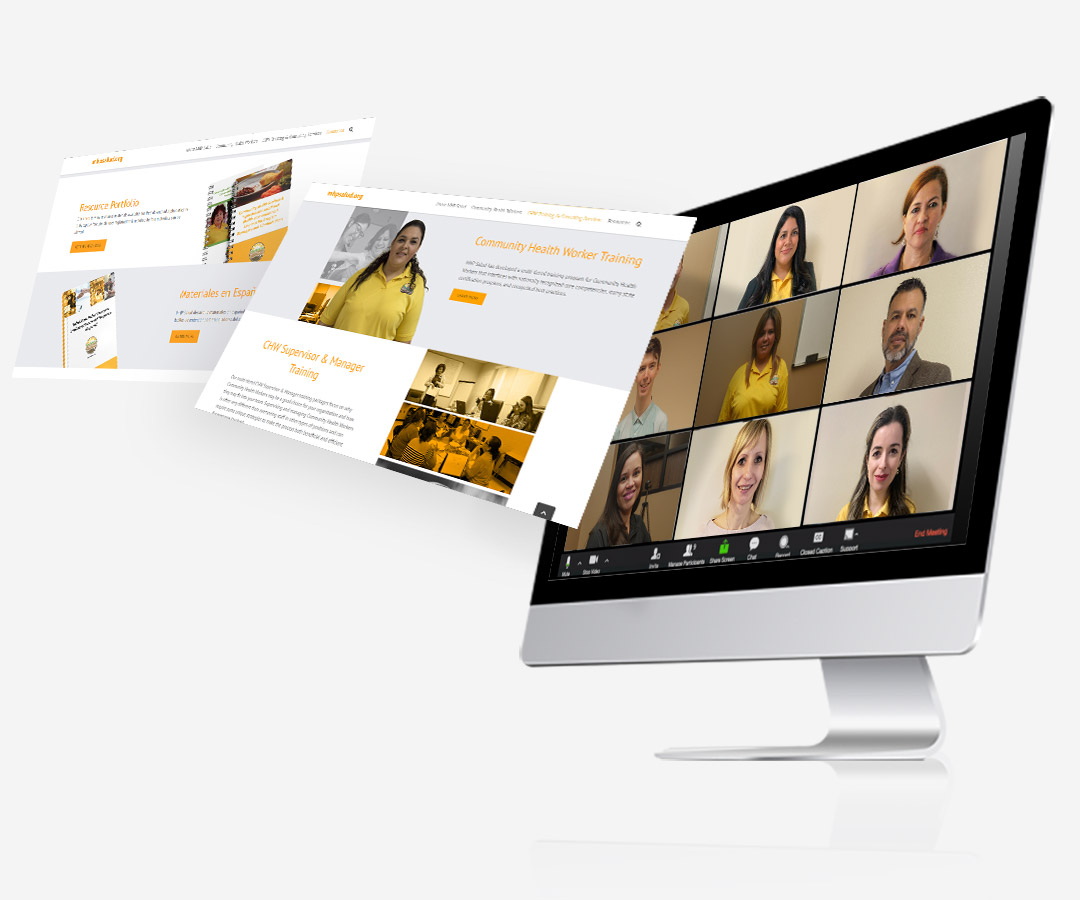Involving Children and Parents in Diabetes Health Education for Youth
Diabetes Across the Lifespan
Published April 2021 | Read this article in Spanish.
Health education is one of the core components of decreasing the prevalence of diabetes and improving health outcomes around the disease, especially when it comes to children. The earlier in a child’s life that they can learn healthy habits, the better their health outcomes will be later in life. Doing this establishes a foundation that will make it easier to maintain healthy behaviors and avoid the controllable factors that contribute to diabetes onset as adults.
However, health education can be complex for children, especially younger children. Educators need to consider several strategies when tailoring their content because learning and cognition vary greatly, even from one year of age to the next. It may seem daunting to have so many contingencies in place depending on the specific age of your audience. This can be partially mitigated by including parents and caregivers in the education curriculum, either in-person or through take-home resources. By involving parents as part of your health education, the opportunity for that information to take root will be prolonged beyond that specific event.
While the strategies for health education for children are nuanced, they are best done in combination with other strategies in order to see the best results. Below you can find proven strategies as outlined in Health Outreach Partners’ COCHEcito curriculum, as well as two examples from community health centers that are using these strategies to deliver successful health education around diabetes.
COCHEcito Curriculum1
Health Outreach Partners (HOP) has over 50 years of working in health outreach at the community health center-level, including decades focused on serving primarily agricultural worker communities. With outreach as the core focus, HOP developed a health education curriculum for conducting these services for health centers serving agricultural workers. This curriculum is entitled COCHE (Curriculum for Outreach Centered Health Education). With COCHE’s success, HOP learned that there was a glaring need for similar material that focused on children, and therefore developed a follow-up curriculum COCHEcito with a focus on agricultural worker children.
Some of the best practices as key points to consider when planning health outreach with farmworker children include but are not limited to the following:
- Involve parents in every step of the process because the most effective health education with farmworker children involves parents.
- Make sure that your health education is “developmentally appropriate” – applying what you know broadly about child development and learning. Specifically, you must apply the interests and needs of individual children, and incorporate the social and cultural contexts in which your farmworker children live.
- Design health education opportunities that prepare, enable, and reinforce the adoption of healthy behaviors.
- Plan health educational sessions with farmworker children that address health, safety, and physical education goals to extend the children’s knowledge of themselves, those around them, and their world.
- Create an effective learning environment for farmworker children where they feel well cared for and safe.
Specifically, COCHEcito delivers tips when working with parents and caregivers. It’s vital to emphasize the importance of keeping parents involved for their child’s sake. They will have a better understanding of how you are helping to prepare their children for success in school and in life and will learn ways in which they can help their children at home. In turn, the children will see that the adults in their lives care about them and are interested in their health, learning, and development. Some situations when you may connect with them include during drop off or pick up of their children, during meetings or parent-teacher conferences, or through sending home notes and materials based on your work with their children.
COCHEcito also recommends activities that parents can engage in to enhance the health education of their children at home or away from the class or event. These activities include:
- Talk with children about their lessons during daily routines such as during meals, bath times, and while driving in the car.
- Help children to name objects in their environment.
- Read through lesson materials together and/or tell stories that reinforce the information learned.
- Recount experiences and stories from the parents’ lives that are important to the lessons.
- Provide opportunities for children to draw and paint, using markers, crayons, and pencils.
Innovative Health Education Practices for Improving Diabetes Outcomes in Children
Denver Health – Denver, CO
MEND Program – Mind, Exercise, Nutrition, Do it!2
Denver Health (DH) is a safety-net health care system that runs 9 community health clinics and 17 school-based health centers, all of which serve low-income, primarily minority populations. DH adopted the MEND approach to support children and parents to achieve a healthier lifestyle, which targets kids ages 6-13 and their families. MEND provides workshops around nutrition and exercise as an initiative to address the root causes of obesity. DH pediatricians refer their patients based on their weight, in which case the entire family will then participate in this program for 10 weeks. Sessions are twice a week and are comprised of nutrition education for the first hour, followed by physical exercise for the children while the parents remain for a facilitated discussion. Approximately 36% (21,000) of DH’s pediatric patients are overweight or obese, so the need is glaring.
The program has shown to be successful in decreasing some of the markers that contribute to the onset of diabetes later in life. Through eight instances of these 10-week MEND programs in 2015-2016, the outcomes in participating children include:
- Average Body Mass Index (BMI) decreased by 0.7 (26.5 to 25.8)
- Waist circumference decreased by 0.4 inches (34.9in to 34.5in)
- Exercise recovery heart rate decreased by 10 beats per minute (104.5 bpm to 94.5 bpm)
- Time spent doing physical activity increased while sedentary activity decreased
- Scores attributed to psychological health (total difficulties and body image) showed a significant positive impact.
Not only did the children show positive outcomes through the MEND program, but even the parents demonstrated benefits to their children’s participation. The parents whose children were involved in the 2015-2016 programs showed increased fruit and vegetable consumption, improved mental health scores, and a decreased average BMI from before the program began to its conclusion. In a separate study in across 2,713 participants in the US from 2008-2017, 90% of the parents of children participants were overweight or obese; however, 67% of parents maintained or reduced their BMI throughout the course of their children participating in the program. This reinforces the fact that parents and caregivers absorb information that their children bring home and can be great partners in ensuring their children’s success while modeling best practices.
North Country Healthcare – Flagstaff, AZ
Diabetes in Pregnancy Program3
North Country HealthCare (NCHC) is the primary health center serving fourteen communities across five northern Arizona counties. NCHC offers a Diabetes Self-Management Education and Support Program (Diabetes Program) to address the growing prevalence of diabetes and obesity. These two conditions drastically and disproportionately affect the community served by the health center. The NCHC Diabetes Program aims to prevent diabetes, reduce the risk of comorbidities among people living with diabetes, and provide a supportive network for people impacted by the condition. The Diabetes Program provides low-cost diabetic retinopathy screenings, free diabetes education classes, and billable shared medical appointments for gestational diabetes.
In January 2015, NCHC received a grant from March of Dimes to implement the Sweet Success Education Program. The goal of Sweet Success is to improve pregnancy outcomes and life-course health for women with diabetes and their children through a series of three one-on-one patient education sessions. After two years of using the individual-based model of care, NCHC modified the program to better suit patient needs by creating a Diabetes in Pregnancy shared medical appointment.
The Diabetes in Pregnancy group model is integrated into the OB/GYN department at NCHC’s Flagstaff location. Women who are at risk of gestational diabetes mellitus or who have diabetes prior to pregnancy are referred to the group appointment. These group education sessions are facilitated by an obstetrics Family Nurse Practitioner (FNP) and trained Community Health Worker. The sessions cover topics such as nutrition, exercise, complications of diabetes in pregnancy, and self-management goals. The shared medical appointments include a brief prenatal check by the FNP before or after the education component, which allows the clinic to bill for the encounter. NCHC found that the opportunity to meet other women with a similar condition and encouragement from providers boosts patient participation.
This article is part of the Diabetes Prevention Across the Lifespan Series, a 4-part article series published by MHP Salud and Health Outreach Partners.
Free Technical Assistance for Service Providers and Individuals that Serve Hispanic Older Adults
Our Strengthening Aging Services for Hispanic Older Adults project is holding Virtual Technical Assistance calls to build the capacity of service providers and community members that address issues in the aging Hispanic communities, on the 3rd Wednesday of every month at 2 pm EST. Get information, tips, resources, and more from our experienced team! Reserve your spot now!
- For more information about the COCHEcito Curriculum, including on how to access a copy, please contact Liam Spurgeon, HOP Project Manager, at liam@outreach-partners.org
- Source: Webinar entitled Diabetes Continuum of Care: Using Health Promotion/Behavior Change to Address Childhood and Adult Obesity and Diabetes, part of the Diabetes in Special & Vulnerable Populations National Learning Series. April 18, 2019. Denver Health presentation presented by Jessica Wallace, Family Medicine Physician Assistant at Denver Health and Hospital Authority.
- Source: Addressing Diabetes Through Outreach – Innovative Outreach Practices Report
This article is supported by the Health Resources and Services Administration (HRSA) of the U.S. Department of Health and Human Services (HHS) as part of awards as follow: Health Outreach Partners (HOP) National Training & Technical Assistance National Cooperative Agreement totaling $932,014.00 with 0 percent financed with non-governmental sources and MHP Salud National Training & Technical Assistance Cooperative Agreement totaling $753,959.00 with 0 percent financed with non-governmental sources. The contents are those of the author(s) and do not necessarily represent the official views of, nor an endorsement, by
HRSA, HHS or the U.S. Government. For more information, visit www.HRSA.gov.
Blog Topics
About MHP Salud

MHP Salud has over 35 years of experience implementing CHW programs and training organizations looking to start and/or strengthen their own CHW programs. Visit our CHW Training & Consulting Services page to learn more about how we can help.






